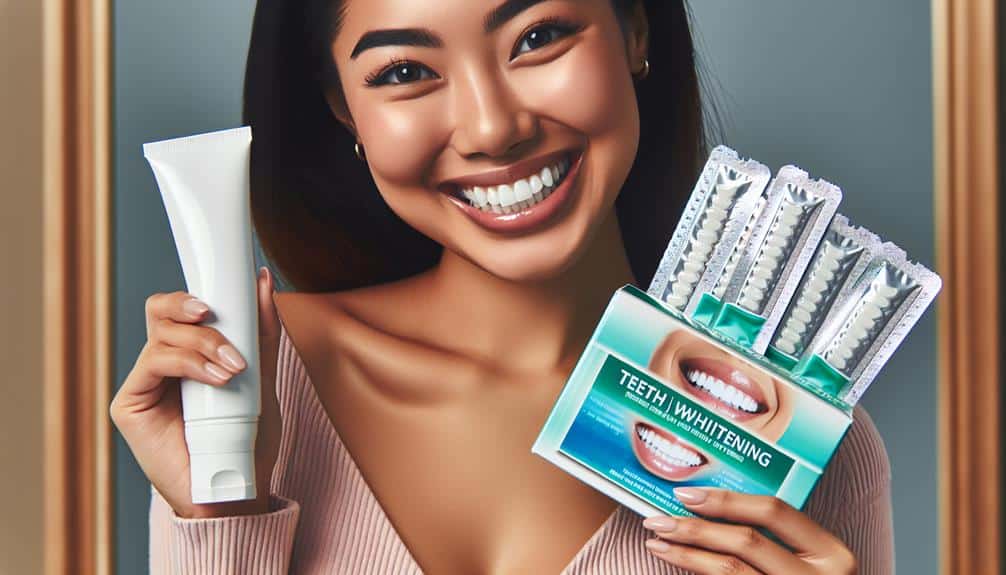For those with sensitive teeth, try gentle whitening toothpaste with natural ingredients like baking soda; it protects enamel without harsh chemicals. Consider professional in-office whitening, consulting your dentist first for effective and long-lasting results with custom trays. At-home whitening kits offer gradual whitening and cost-effectiveness with natural options. Discover more about sensitive-friendly teeth whitening techniques by exploring these top options.
Key Points
- Consider gentle whitening toothpaste with natural ingredients and enamel protection for sensitive-friendly whitening.
- Opt for professional in-office whitening with custom trays and higher concentration agents for quick and effective results.
- Choose at-home whitening kits with moldable trays for gradual whitening and cost-effective, sensitive-friendly treatment.
- Prioritize safety and effectiveness in controlled settings for professional whitening, ensuring suitability and long-term benefits.
- Evaluate the benefits of each option for sensitive-friendly teeth whitening based on individual needs and preferences.
Gentle Whitening Toothpaste
If you're looking to gently whiten your teeth, consider incorporating a gentle whitening toothpaste into your oral care routine. These toothpastes are formulated with natural ingredients that can help brighten your smile without causing sensitivity. Look for products that contain gentle abrasives like baking soda or silica for effective yet mild whitening. Additionally, seek out toothpaste with enamel protection properties to safeguard your teeth while achieving a brighter appearance.
When selecting a gentle whitening toothpaste, prioritize ones that are free from harsh chemicals and artificial additives. Natural ingredients like activated charcoal, coconut oil, or essential oils can aid in removing surface stains gently. These components work to polish the teeth without eroding the enamel, ensuring a safe whitening experience.
Professional In-Office Whitening
Consider important in-office whitening for a quick and effective way to achieve a brighter smile. A dentist consultation is essential before undergoing this procedure to make sure it's suitable for your teeth and gums. During the appointment, the dentist will assess your oral health and discuss the best course of action for whitening. One of the main advantages of professional in-office whitening is the use of custom trays. These trays are tailored to fit your teeth precisely, allowing for an even distribution of the whitening agent. The custom trays also help protect your gums from irritation during the whitening process.
Professional in-office whitening typically involves a higher concentration of whitening agents compared to over-the-counter products, resulting in faster and more noticeable results. The procedure is performed in a controlled environment, ensuring safety and effectiveness. While professional whitening may be more expensive that at-home kits, the results are often more dramatic and longer-lasting. If you're looking for a reliable and efficient way to whiten your teeth, professional in-office whitening could be the right choice for you.
At-Home Whitening Kits
For individuals seeking a convenient teeth whitening solution at home, explore the effectiveness of at-home whitening kits. These kits offer a practical way to achieve a brighter smile without the need for frequent visits to the dentist. Here are some key points to keep in mind:
- Customized Whitening: At-home whitening kits often come with custom trays that mold to your teeth, ensuring even and thorough whitening results.
- Gradual Whitening: Unlike some professional treatments that can lead to sensitivity, at-home kits usually allow for a more gradual whitening process, minimizing discomfort.
- Cost-Effective: Investing in an at-home whitening kit can be a cost-effective solution compared to multiple visits to the dentist for professional whitening treatments.
While at-home whitening kits are convenient and effective, it's important to follow the instructions carefully to avoid potential issues. For those looking for more natural remedies or DIY solutions, some kits offer options that incorporate these preferences, catering to a variety of individual needs and preferences.
Frequently Asked Questions
Are There Any Natural Remedies or DIY Techniques That Can Help Whiten Sensitive Teeth?
To whiten sensitive teeth naturally, explore DIY techniques like using baking soda mixed with water as a gentle abrasive. Remember, sensitivity prevention is key. Consult with your dentist for personalized advice on maintaining a healthy, bright smile.
Can Teeth Whitening Products Cause Sensitivity, and if So, How Can This Be Minimized?
Teeth whitening products can cause sensitivity for some. To minimize this, focus on sensitivity prevention by using gentle whitening techniques. Remember, 60% of users report some sensitivity, but choosing products with lower bleaching concentrations can help.
What Are Some Common Misconceptions About Teeth Whitening for Sensitive Teeth?
When it comes to teeth whitening myths for sensitive teeth, understand that sensitivity factors vary. Common misconceptions include the belief that all professional treatments cause sensitivity and that home remedies are always gentle. Educate yourself for the best results.
Are There Any Long-Term Effects of Using Teeth Whitening Products on Sensitive Teeth?
Using teeth whitening products on sensitive teeth may increase sensitivity risks long-term. To manage this, consider using desensitizing toothpaste before whitening, opting for gentler formulas, and spacing out treatments to prevent overexposure and maintain dental health.
How Can I Maintain the Results of My Teeth Whitening Treatment for Sensitive Teeth?
To maintain teeth whitening results for sensitive teeth, try these maintenance tips: avoid staining foods/drinks, use a sensitive toothpaste, and regular touch-ups. Prevent sensitivity by using desensitizing products before and after treatment. Debunk whitening myths for a successful outcome.



